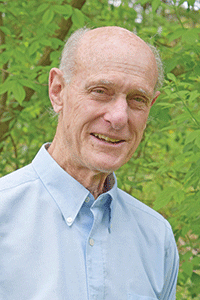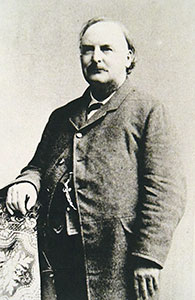
Thousands of Minnesota “wives and children owe their homes to the foresight and wisdom” of a man from Houston County, stated the Duluth Daily Short Line. In the first Minnesota legislature of 1858, a young senator from Caledonia authored a bill, which decades later was still praised by a Washington, D.C. publication as one of the state’s best laws. Houston County pioneer, poet, Civil War soldier and attorney – O. W. Streeter – was also a man of the great American West with exploits from the Black Hills to Mexico.
While persevering as a homeless youth, Streeter arrived as an 1836 teenager in northwest Illinois, where he worked and studied law in Galena and then in Beetown, Wisconsin Territory, where he married in 1848. He was admitted to practice law in 1851, and after relocating west of the Mississippi River, briefly in Iowa and then in 1853 in Minnesota at Wild Cat Bluff, was one of the first practicing attorneys in Houston County. In 1854, he was offered a territorial judgeship; In 1855, he was the first county attorney for Houston County.
Streeter built a log cabin store in Caledonia, which in the mid-1850s, became the village’s first schoolhouse. Although the naming of Houston County (for Mexican War hero Sam Houston) is usually attributed to war veteran Samuel McPhail, it was Streeter who ensured its adoption by the county commissioners.

Photo courtesy of the Houston County Historical Society
His reputation as a champion of the common man was established after being chosen to conduct the 1854 sale of public land at the United States Land office for the Root River District, headquartered at Brownsville. According to the Preston Democrat, Streeter took the position with the expressed understanding that he would be able to favor the squatters over land sharks.
On the first day of sale, many settlers crowded into Brownsville along with three to four hundred land speculators, who intended to bid on land for which the squatters (who had the option to buy for a federal minimum $1.25 per acre) did not have the available cash. But Streeter, himself a pioneer settler, offered lenient terms to settlers who needed time to raise money. He refused to accept the bids of speculators, who became so enraged they schemed to throw Streeter into the Mississippi River. But the settlers, whom he had defended, discovered the plot and came to his rescue, driving the land sharks out of Brownsville – some heading into the hills, others escaping on their boats.
Three years later (1857), Streeter was elected a member of the constitutional convention of Minnesota. Statehood came in 1858, and Streeter was elected senator in the first state legislature. For the Census of 1860, he was appointed by President Buchanan as special agent for all unorganized territory of the United States.
Controversy came with his effort to protect the poor and dispossessed. In the state legislature, he authored the Homestead Exemption Bill, which the United States Democrat said was “opposed by every capitalist and every lawyer in the State, but was passed and became a law, one of the best in that state. Till its passage a sheriff could sell even a shirt from a baby if needed to satisfy a claim of a debtor or usurer.”
The law prohibited the forced sale of farm acreage or a city residence in relation to a debt. No mortgage could be placed on a farm or home without the consent of the wife, and in the case of the death of the parents, the property would belong to the children.
During the struggle for passage, Streeter was labeled “a crank.” But after the bill became law, Streeter was serenaded by hundreds of mechanics in St. Paul. In his absence, citizens filled room 48 at the old American Hotel with gifts of gratitude: cigars, wines, fruit and numerous delicacies.
After adventurous business travels in the western states and territories, Streeter spent his later years as a prominent U. S. attorney in Superior, Wis. He was brought back to Caledonia for burial in 1902. The impressive legacy created in his adulthood is certainly worthy of recognition, but for the reader, his childhood experiences will likely create the most enduring memories. Those will be related next week.


Lila Salwey says
Really like the series about Houston county.